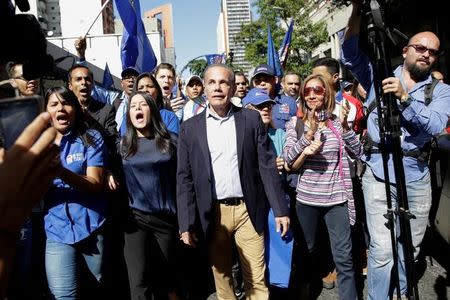Venezuela opposition coalition split ahead of new vote
By Andrew Cawthorne and Isaac Urrutia
CARACAS/MARACAIBO, Venezuela (Reuters) - One of Venezuela's major opposition parties has decided to run in local elections next month despite a boycott by others, deepening a split in the Democratic Unity coalition to the glee of President Nicolas Maduro and his ruling Socialist Party.
Three of the four main groupings in the coalition have vowed not to participate in the Dec. 10 balloting for 335 mayors and one governor because they believe the election system is rigged.
But the fourth party, A New Time, based in oil-rich western Zulia state where the governorship is up for grabs, argues Maduro must still be fought at the ballot box to avoid simply handing him more political space.
Manuel Rosales, a former Zulia governor who fled to Peru in 2009 after corruption charges leveled by the government of Maduro's predecessor Hugo Chavez, said on Thursday he would be running again on behalf of A New Time.
"I'm not going to leave Zulianos alone," Rosales told supporters.
Rosales was jailed in 2015 on his return from exile. Authorities lifted a ban on him running for office just this week.
His party's stance has infuriated many anti-Maduro activists. Another opposition leader won the Zulia governorship in elections last month but was prohibited from taking office for refusing to bow to a pro-Maduro legislative superbody.
"He's a sellout," said Juan Carlos Rivero, 34, at an auto repair shop in Zulia state capital Maracaibo. He had voted for Rosales in the past but did not plan to in December.
OPPOSITION LEADERS UNDER PRESSURE
Having failed to oust Maduro via street protests earlier this year - which left at least 125 people dead - and having then performed badly in the Oct. 15 gubernatorial vote, Venezuela's opposition is in its worst crisis of recent years.
Though polls show it has majority support, and Venezuelans are angry at Maduro over an unprecedented economic crisis, the opposition has failed to capitalize.
Maduro has been exulting in the opposition disarray, saying parties ordering members to abstain next month were behaving undemocratically even as they accuse him of being a "dictator."
"When they lose elections, they cry fraud and when they know things are against them, instead of fighting, they withdraw," Maduro said in a recent speech, adding that Venezuela's elections were clean.
There is speculation the government may take advantage of opposition weakness by moving up the expected December 2018 date for Venezuela's next presidential election.
Various opposition politicians, including twice-presidential candidate Henrique Capriles, remain banned from standing for office on various charges of corruption or plotting.
And rights groups say there are nearly 400 political prisoners, including well-known protest leader Leopoldo Lopez. Authorities deny political persecution, saying all detentions of politicians are for breaking the law.
In the latest threats against opposition leaders, Maduro said in a speech on Friday that congress head Julio Borges should be tried for treason after lobbying against his government abroad, including in financial circles.
The pro-Maduro Supreme Court, meanwhile, said opposition leader Freddy Guevara - who runs the militant Popular Will party in the absence of its leader Lopez - should be prosecuted for "instigation" and using children in protests.
Guevara, who is congress vice president, was prohibited from leaving the country.
(Additional reporting by Eyanir Chinea; Editing by Alexandra Ulmer and Tom Brown)



